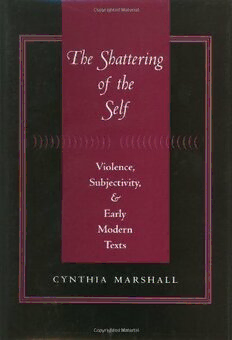Download The Shattering of the Self: Violence, Subjectivity, and Early Modern Texts PDF Free - Full Version
Download The Shattering of the Self: Violence, Subjectivity, and Early Modern Texts by Cynthia Marshall in PDF format completely FREE. No registration required, no payment needed. Get instant access to this valuable resource on PDFdrive.to!
About The Shattering of the Self: Violence, Subjectivity, and Early Modern Texts
In The Shattering of the Self: Violence, Subjectivity, and Early Modern Texts, Cynthia Marshall reconceptualizes the place and function of violence in Renaissance literature. During the Renaissance an emerging concept of the autonomous self within art, politics, religion, commerce, and other areas existed in tandem with an established, popular sense of the self as fluid, unstable, and volatile. Marshall examines an early modern fascination with erotically charged violence to show how texts of various kinds allowed temporary release from an individualism that was constraining. Scenes such as Gloucester's blinding and Cordelia's death in King Lear or the dismemberment and sexual violence depicted in Titus Andronicus allowed audience members not only a release but a "shattering"—as opposed to an affirmation—of the self.Marshall draws upon close readings of Shakespearean plays, Petrarchan sonnets, John Foxe's Acts and Monuments of the Christian Martyrs, and John Ford's The Broken Heart to successfully address questions of subjectivity, psychoanalytic theory, and identity via a cultural response to art. Timely in its offering of an account that is both historically and psychoanalytically informed, The Shattering of the Self argues for a renewed attention to the place of fantasy in this literature and will be of interest to scholars working in Renaissance and early modern studies, literary theory, gender studies, and film theory.
Detailed Information
| Author: | Cynthia Marshall |
|---|---|
| Publication Year: | 2002 |
| ISBN: | 9780801867781 |
| Pages: | 231 |
| Language: | English |
| File Size: | 0.702 |
| Format: | |
| Price: | FREE |
Safe & Secure Download - No registration required
Why Choose PDFdrive for Your Free The Shattering of the Self: Violence, Subjectivity, and Early Modern Texts Download?
- 100% Free: No hidden fees or subscriptions required for one book every day.
- No Registration: Immediate access is available without creating accounts for one book every day.
- Safe and Secure: Clean downloads without malware or viruses
- Multiple Formats: PDF, MOBI, Mpub,... optimized for all devices
- Educational Resource: Supporting knowledge sharing and learning
Frequently Asked Questions
Is it really free to download The Shattering of the Self: Violence, Subjectivity, and Early Modern Texts PDF?
Yes, on https://PDFdrive.to you can download The Shattering of the Self: Violence, Subjectivity, and Early Modern Texts by Cynthia Marshall completely free. We don't require any payment, subscription, or registration to access this PDF file. For 3 books every day.
How can I read The Shattering of the Self: Violence, Subjectivity, and Early Modern Texts on my mobile device?
After downloading The Shattering of the Self: Violence, Subjectivity, and Early Modern Texts PDF, you can open it with any PDF reader app on your phone or tablet. We recommend using Adobe Acrobat Reader, Apple Books, or Google Play Books for the best reading experience.
Is this the full version of The Shattering of the Self: Violence, Subjectivity, and Early Modern Texts?
Yes, this is the complete PDF version of The Shattering of the Self: Violence, Subjectivity, and Early Modern Texts by Cynthia Marshall. You will be able to read the entire content as in the printed version without missing any pages.
Is it legal to download The Shattering of the Self: Violence, Subjectivity, and Early Modern Texts PDF for free?
https://PDFdrive.to provides links to free educational resources available online. We do not store any files on our servers. Please be aware of copyright laws in your country before downloading.
The materials shared are intended for research, educational, and personal use in accordance with fair use principles.

